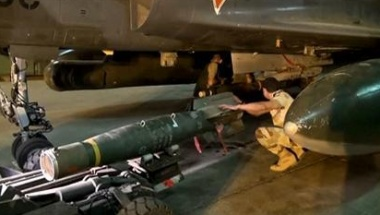French Attacks, Backed By US, Beat Back Mali Rebels

French fighter jets bombed an Islamist rebel stronghold deep in northern Mali Sunday as France poured more troops into the capital Bamako, awaiting a West African force to dislodge al Qaeda-linked insurgents from the north.
Meanwhile, the French foreign minister said the United States is providing communications and transport help for the international military intervention.
Laurent Fabius said the three-day-old, French-led military operation has succeeded in halting the extremists’ advance, which had prompted the intervention, the Associated Press reported. He stressed that the operation is gaining international backing.
“We have the support of the Americans for communications and transport,” Fabius said on RTL radio Sunday. Britain, Denmark, and other European countries also are helping, the foreign minister said. But he gave no details about the backup.
U.S. officials said Saturday they had offered to send drones to Mali. British Prime Minister David Cameron agreed to send aircraft to help transport troops.
"Mali is now at the mercy of the French army. They are bombing the north, they have killed many terrorists," an informed Malian official in Bamako told The Guardian. "The Islamists have been running into the desert – they have deserted Gao and Timbuktu."
The attack on Gao, the largest city in the desert region controlled by the Islamist alliance, marked a major escalation on the third day of French air raids, striking at the heart of the vast territory seized by rebels in April.
France is determined to end Islamist domination of north Mali, which many fear could act as a base for attacks on the West and for links with al Qaeda in Yemen, Somalia and North Africa.
Defense Minister Jean-Yves Le Drian said French intervention on Friday had prevented the advancing rebels from seizing Bamako, Reuters reported. He vowed that air strikes would continue.
"The president [Francois Hollande] is totally determined that we must eradicate these terrorists who threaten the security of Mali, our own country and Europe," he told French television.
In Gao, a dusty town on the banks of the Niger river where Islamists have imposed a brutal form of sharia law, residents told Reuters French jets pounded the airport and rebel positions. A huge cloud of black smoke rose from the militants' camp in the city's north, and pickup trucks ferried dead and wounded to hospitals.
"The planes are so fast you can only hear their sound in the sky," resident Soumaila Maiga told Reuters by telephone. "We are happy, even though it is frightening. Soon we will be delivered."
Paris said four Rafale jets flew from France to strike rebel training camps, logistics depots and infrastructure in Gao with the aim of weakening the rebels and preventing them from returning southward.
A spokesman for Ansar Dine, one of the main Islamist factions, said the French had also bombed targets in the towns of Lere and Douentza. Residents said rebel fighters had fled Douentza aboard pickup trucks.
But the intervention has come with a human cost in the city of Konna, the first to be bombed Friday and Saturday, the AP reported. Mali presidential spokesman Ousmane Sy said 11 Malians were killed. The town’s mayor, Sory Diakite, said the dead included three children who threw themselves into a river and drowned trying to avoid the falling bombs.
France has deployed about 550 soldiers to Mali under "Operation Serval" - named after an African wildcat - split between Bamako and the town of Mopti, 500 km (300 miles) north.
In Bamako, a Reuters cameraman saw more than 100 French troops disembark Sunday from a military cargo plane at the airport.
In the city some cars drove around with French flags draped from the windows to celebrate the intervention.
More than two decades of peaceful elections had earned Mali a reputation as a bulwark of democracy, but that image unraveled in a matter of weeks after a military coup in March which left a power vacuum for the Islamist rebellion.
Hollande's intervention in Mali has won plaudits from leaders in Europe, Africa and the United States but it is not without risks.
It raised the threat level for eight French hostages held by al Qaeda allies in the Sahara and for the 30,000 French expatriates living in neighboring, mostly Muslim states.
Concerned about reprisals, France has tightened security at public buildings and on public transport. It advised its 6,000 citizens to leave Mali as spokesmen for Ansar Dine and al Qaeda's North Africa wing AQIM promised to exact revenge.
In its first casualty of the campaign, Paris said a French pilot was killed on Friday when rebels shot down his helicopter.
Hours earlier, a French intelligence officer held hostage in Somalia by al Shabaab extremists linked to al Qaeda was killed in a failed commando raid to free him.
President Hollande says France's aim is simply to support a mission by West African bloc ECOWAS to retake the north, as mandated by a U.N. Security Council resolution in December.
With Paris pressing West African nations to send their troops quickly, Ivory Coast President Alassane Ouattara, who holds the rotating ECOWAS chairmanship, kick-started the operation to deploy 3,300 African soldiers.
Ouattara, installed in power with French military backing in 2011, convened a summit of the 15-nation bloc for Saturday in Ivory Coast to discuss the mission.
"The troops will start arriving in Bamako today and tomorrow," said Ali Coulibaly, Ivory Coast's African Integration Minister. "They will be convoyed to the front."
© Copyright IBTimes 2024. All rights reserved.





















